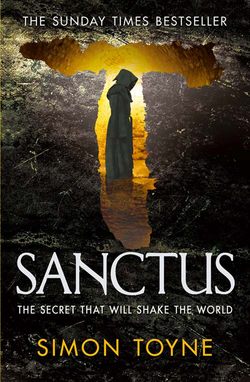Читать книгу Sanctus - Simon Toyne, Simon Toyne - Страница 34
28
ОглавлениеAthanasius hurried up the corridor after the Abbot, their personal haloes brightening with every step they took.
‘So tell me,’ the Abbot said, without breaking stride, ‘who has made contact from the investigation?’
‘An Inspector Arkadian has been assigned to the case,’ Athanasius replied breathlessly. ‘He has already requested an interview with someone who might have information on the deceased. I told our brothers on the outside to say that the death was a tragedy and we would do everything we could to assist.’
‘Did you say whether he was known to us?’
‘I said there were many people living and working inside the Citadel and we would endeavour to discover if any of them were missing. I wasn’t sure whether or not we wanted to claim him as ours at this point, or whether you would prefer us to remain distant.’
The Abbot nodded. ‘You did well. Inform the public office to maintain the same courteous degree of cooperation, for now. It may be that the question of Brother Samuel’s body will resolve itself without our interference. Once the authorities have completed the post-mortem and no family members come forward to claim the body, we can step forward and offer to take it as a gesture of compassion. It will show to the world what a loving and caring church we are, one prepared to embrace a poor, wretched soul who sought to end his life in such a lonely and tragic way. It will also bring Brother Samuel back to us without our having to admit kinship.’
The Abbot stopped and turned, fixing Athanasius with his sharp, grey eyes.
‘However, in the light of what you have just read we must also be vigilant. We must leave nothing to chance. If anything unusual is reported, anything at all, then we must be ready to get Brother Samuel’s body back immediately, and by any means necessary.’ He stared at Athanasius from beneath his beetled brows. ‘That way, if some miracle does come to pass and he rises again, he will at least be in our custody. Whatever happens, we cannot let our enemies take possession of his body.’
‘As you wish,’ Athanasius replied. ‘But surely if what you have just shown me is the only remaining copy of the book, who else would know of the …’ he hesitated, not quite sure how to describe the ancient words scratched on the sheet of slate. He didn’t want to use the word ‘prophecy’ because that would imply that the words were the will of God, which in itself would be heresy. ‘Who else could know the specifics of the … prediction …?’
The Abbot nodded approvingly, picking up on his chamberlain’s caution. It confirmed to him that Athanasius was the right man to handle the official side of the situation; he had the political sophistication and the discretion for it. The unofficial side he would handle himself. ‘We cannot simply trust that the destruction of all the books and the people who carried them has also destroyed the words and thoughts they contained,’ he explained. ‘Lies are like weeds. You can grub them up, poison the root, burn them away to nothing – but they always find a way to return. So we must assume that this “prediction”, as you wisely refer to it, will be known in some form to our enemies, and that they will be preparing to act upon it. But do not worry, Brother,’ he said, laying a hand heavy as a bear’s paw on Athanasius’s shoulder. ‘We have withstood far more than this in our long and colourful history. We must simply do now as we have always done: stay one step ahead, pull up the drawbridge and wait for the outside threat to withdraw.’
‘And if it does not?’ Athanasius asked.
The hand tightened on his shoulder. ‘Then we attack it with everything we have.’
